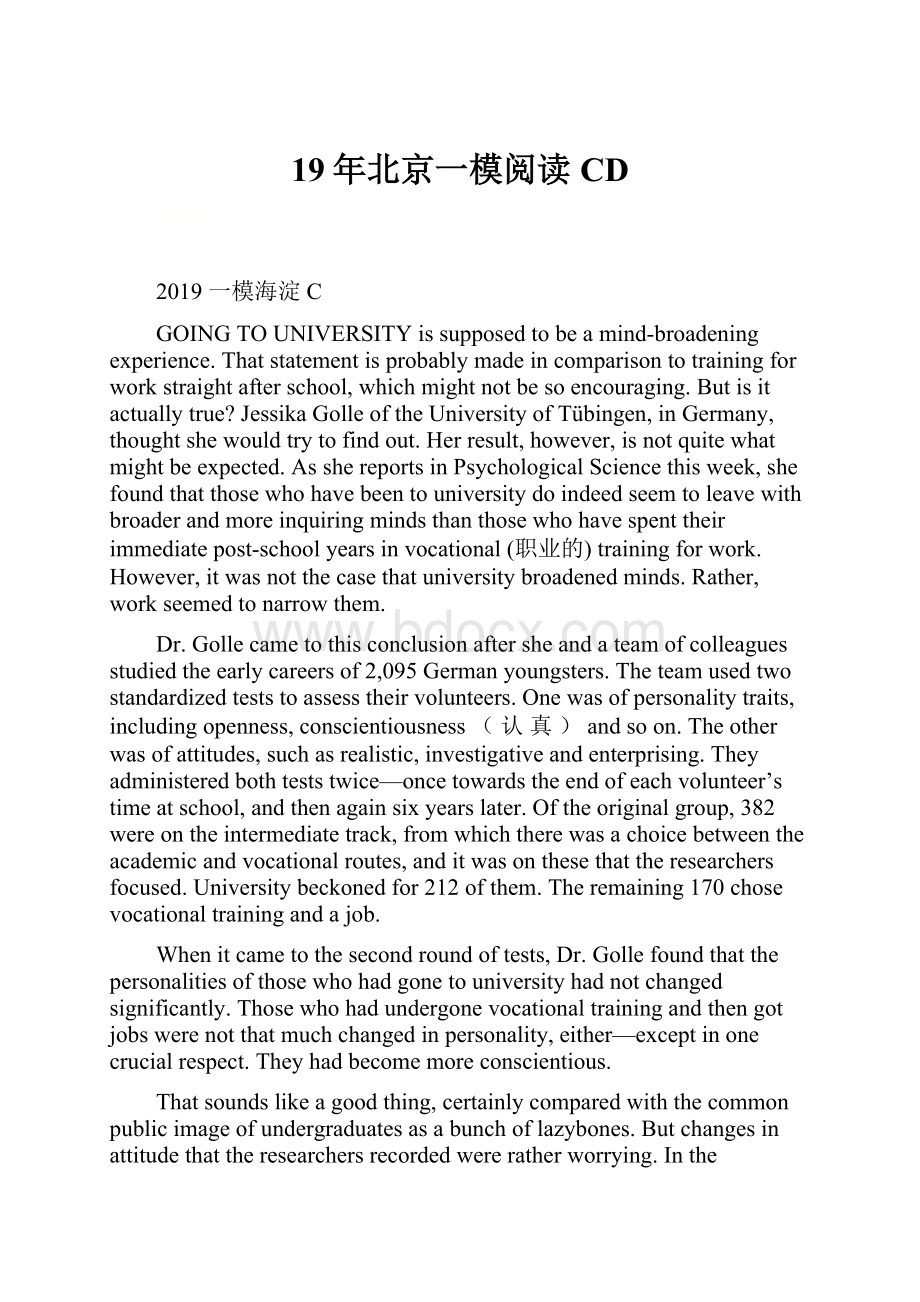19年北京一模阅读CD.docx
《19年北京一模阅读CD.docx》由会员分享,可在线阅读,更多相关《19年北京一模阅读CD.docx(24页珍藏版)》请在冰豆网上搜索。

19年北京一模阅读CD
2019一模海淀C
GOINGTOUNIVERSITYissupposedtobeamind-broadeningexperience.Thatstatementisprobablymadeincomparisontotrainingforworkstraightafterschool,whichmightnotbesoencouraging.Butisitactuallytrue?
JessikaGolleoftheUniversityofTübingen,inGermany,thoughtshewouldtrytofindout.Herresult,however,isnotquitewhatmightbeexpected.AsshereportsinPsychologicalSciencethisweek,shefoundthatthosewhohavebeentouniversitydoindeedseemtoleavewithbroaderandmoreinquiringmindsthanthosewhohavespenttheirimmediatepost-schoolyearsinvocational(职业的)trainingforwork.However,itwasnotthecasethatuniversitybroadenedminds.Rather,workseemedtonarrowthem.
Dr.Gollecametothisconclusionaftersheandateamofcolleaguesstudiedtheearlycareersof2,095Germanyoungsters.Theteamusedtwostandardizedteststoassesstheirvolunteers.Onewasofpersonalitytraits,includingopenness,conscientiousness(认真)andsoon.Theotherwasofattitudes,suchasrealistic,investigativeandenterprising.Theyadministeredbothteststwice—oncetowardstheendofeachvolunteer’stimeatschool,andthenagainsixyearslater.Oftheoriginalgroup,382wereontheintermediatetrack,fromwhichtherewasachoicebetweentheacademicandvocationalroutes,anditwasonthesethattheresearchersfocused.Universitybeckonedfor212ofthem.Theremaining170chosevocationaltrainingandajob.
Whenitcametothesecondroundoftests,Dr.Gollefoundthatthepersonalitiesofthosewhohadgonetouniversityhadnotchangedsignificantly.Thosewhohadundergonevocationaltrainingandthengotjobswerenotthatmuchchangedinpersonality,either—exceptinonecrucialrespect.Theyhadbecomemoreconscientious.
Thatsoundslikeagoodthing,certainlycomparedwiththecommonpublicimageofundergraduatesasabunchoflazybones.Butchangesinattitudethattheresearchersrecordedwereratherworrying.Intheuniversitygroup,again,noneweredetectable.Butthosewhohadchosenthevocationalrouteshowedmarkeddropsininterestintasksthatareinvestigativeandenterprisinginnature.Andthatmightrestricttheirchoiceofcareers.
Someinvestigativeandenterprisingjobs,suchasscientificresearch,are,indeedbeyondthedegreeless.Butmany,particularlyinGermany,withitstraditionofvocationaltraining,arenot.Theresearchersmention,forexample,computerprogrammersandfinance-sectorworkersascareersrequiringthesetraits.IfDr.Golleiscorrect,andchangesinattitudebroughtaboutbytheverytrainingGermanypridesitselfonarenarrowingpeople’schoices,thatisindeedamatterworthyofseriousconsideration.
38.Whichofthefollowingcanbestreplace“beckonedfor”inParagraph2?
A.Examined.B.Attracted.C.Organized.D.Recognized.
39.Whatcanwelearnfromtheresearch?
A.Thedegreelesshavenotchangedinpersonalities.
B.Goingtouniversityisamind-broadeningexperience.C.Workingstraightafterschoolnarrowspeople’sminds.D.Collegestudentspridethemselvesontheireducation.
40.Accordingtothelasttwoparagraphs,.A.collegestudentsenjoyaverygoodpublicimage
B.theundergraduateshavechangedsignificantlyinattitude
C.thedegreelessaremuchbetteratdealingwithchallengingtasks
D.peopleshowlessinterestininvestigativejobsduetovocationaltraining
41.Whatistheauthor’sattitudetowardsthefinding?
A.Concerned.B.Optimistic.C.Unclear.D.Sceptical.
2019一模海淀D
Smile!
Itmakeseveryoneintheroomfeelbetterbecausethey,consciouslyorunconsciously,aresmilingwithyou.Growingevidenceshowsthataninstinctforfacialmimicry(模仿)allowsustoempathizewithandevenexperienceotherpeople’sfeelings.Ifwecan’tmirroranotherperson’sface,itlimitsourabilitytoreadandproperlyreacttotheirexpressions.AreviewofthisemotionalmirroringappearsonFebruary11inTrendsinCognitiveSciences.
Intheirpaper,PaulaNiedenthalandAdrienneWood,socialpsychologistsattheUniversityofWisconsin,describehowpeopleinsocialsituationscopyothers’facialexpressionstocreateemotionalresponsesinthemselves.Forexample,ifyou’rewithafriendwholookssad,youmight“tryon”thatsadfaceyourselfwithoutrealizingyou’redoingso.In“tryingon”yourfriend’sexpression,ithelpsyoutorecognizewhatthey’refeelingbyassociatingitwithtimesinthepastwhenyoumadethatexpression.Humansgetthisemotionalmeaningfromfacialexpressionsinamatterofonlyafewhundredmilliseconds.
“Youreflectonyouremotionalfeelingsandthenyougeneratesomesortofrecognitionjudgment,andthemostimportantthingthatresultsinisthatyoutaketheappropriateaction—youapproachthepersonoryouavoidtheperson,”Niedenthalsays.“Yourownemotionalreactiontothefacechangesyourperceptionofhowyouseethefaceinsuchawaythatprovidesyouwithmoreinformationaboutwhatitmeans.”
Aperson’sabilitytorecognizeand“share”others’emotionscanbepreventedwhentheycan’tmimicfaces.Thisisacommoncomplaintforpeoplewithmotordiseases,likefacialparalysis(瘫痪)fromastroke,orevenduetonervedamagefromplasticsurgery.Niedenthalnotesthatthesamewouldnotbetrueforpeoplewhosufferfromparalysisfrombirth,becauseifyou’veneverhadtheabilitytomimicfacialexpressions,youwillhavedevelopedcompensatorywaysofinterpretingemotions.
Peoplewithsocialdisordersassociatedwithmimicryoremotion-recognitiondamage,likeautism(自闭症),canexperiencesimilarchallenges.“Therearesomesymptomsinautismwherelackoffacialmimicrymayinpartbeduetolimitationofeyecontact,”Niedenthalsays.
Niedenthalnextwantstoexplorewhatpartinthebrainisfunctioningtohelpwithfacialexpressionrecognition.Abetterunderstandingofthatpart,shesays,willgiveusabetterideaofhowtotreatrelateddisorders.
42.Accordingtothepassage,facialmimicryhelps.
A.experienceone’sownfeelingsclearlyB.changeothers’emotionsquickly
C.respondtoothers’expressionsproperlyD.developfriendshipwithotherseasily
43.WecanknowfromParagraph4and5that.A.peoplewithmotordiseasesmayalsosufferfromautism
B.peoplebornwithfacialparalysismaystillrecognizeemotions
C.peoplewithsocialdisorderscan’thaveeyecontactwithothers
D.peoplereceivingplasticsurgeryhavedifficultyinmimickingfaces
44.AccordingtoNiedenthal,thenextstepofthestudywillfocuson.A.howwecantreatbraindisorders
B.whatcanbedonetoregainfacialmimicry
C.howourbrainhelpsuswithemotionalmirroring
D.whatpartofourbrainhelpsrecognizefacialexpression
45.Thepassageiswrittento.
A.discusshowpeoplereactpositivelytoothers’smilesB.drawpeople’sattentiontothosewithsocialdisorders
C.introduceanewtrendinfacialexpressionrecognition
D.explainhowemotionalmirroringaffectspeople’sempathy
2019一模西城C
Likemanyotherpeoplewhospeakmorethanonelanguage,IoftenhavethesensethatI’maslightlydifferentpersonineachofmylanguages—moreconfidentinEnglish,morerelaxedinFrench,moreemotionalinCzech.Isitpossiblethat,alongwiththesedifferences,mymoralcompass(指南针)alsopointsinsomewhatdifferentdirectionsdependingonthelanguageI’musingatthetime?
Psychologistswhostudymoraljudgmentshavebecomeveryinterestedinthisquestion.Thefindingsofseveralrecentstudiessuggestthatwhenpeoplearefacedwithmoraldilemmas(困境),theydoindeedresponddifferentlywhenconsideringtheminaforeignlanguagethanwhenusingtheirnativetongue.
Ina2014paperledbyAlbertCosta,volunteerswerepresentedwithamoraldilemmaknownasthe“trolleyproblem”:
imaginethatarunawaytrolleyismovingquicklytowardagroupoffivepeoplestandingonthetracks,unabletomove.Youarenexttoaswitchthatcanmovethetrolleytoadifferentsetoftracks,thereforesparingthefivepeople,butresultinginthedeathofonewhoisstandingonthesidetracks.Doyoupulltheswitch?
Mostpeopleagreethattheywould.Butwhatiftheonlywaytostopthetrolleyisbypushingalargestrangeroffafootbridgeintoitspath?
Peopletendtobeveryhesitanttosaytheywoulddothis,eventhoughinbothsituations,onepersonissacrificedtosavefive.ButCostaandhiscolleaguesfoundthatpresentingthedilemmainalanguagethatvolunteershadlearnedasaforeigntonguedramaticallyincreasedtheirstatedwillingnesstopushthesacrificialpersonoffthefootbridge,fromfewerthan20%ofrespondentsworkingintheirnativelanguagetoabout
50%ofthoseusingtheforeignone.
Whydoesitmatterwhetherwejudgemoralityinournativelanguageoraforeignone?
Accordingtooneexplanation,suchjudgmentsinvolvetwoseparateandcompetingwaysofthinking—oneofthese,aquick,natural“feeling,”andtheother,carefuldeliberationaboutthegreatestgoodforthegreatestnumber.Whenweuseaforeignlanguage,weunconsciouslysinkintothemorecarefulwaysimplybecausetheeffortofoperatinginournon-nativelanguagesignalsourcognitive(认知的)systemtopreparefordifficultactivity.
Analternativeexplanationisthatdifferencesarisebetweennativeandforeigntonguesbecauseourchildhoodlanguagesarefilledwithgreateremotionsthanarethoselearnedinmoreacademicsettings.Asaresult,moraljudgmentsmadeinaforeignlanguagearelessfilledwiththeemotionalreactionsthatsurfacewhenweusealanguagelearnedinchildhood.
There’sstrongevidencethatmemoryconnectsalanguagewiththeexperiencesandinteractionsthroughwhichthatlanguagewaslearne